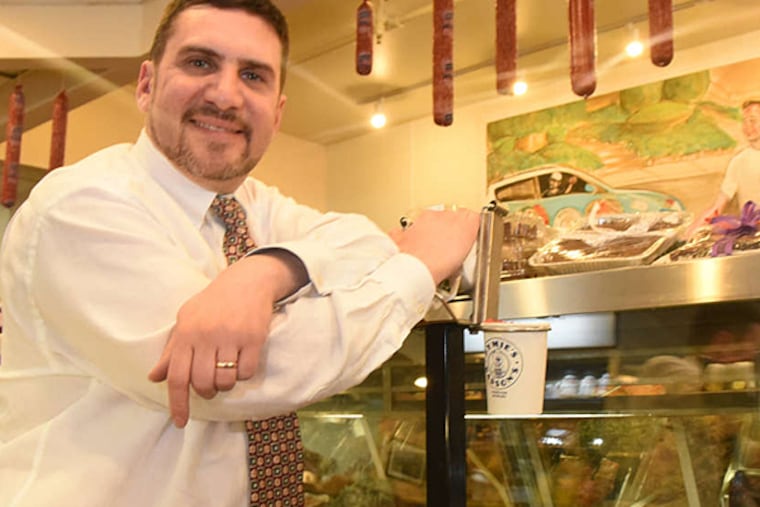Jewish delis: Co-opted by assimilation
Like a lot of people might have aspired to, Ted Merwin, Ph.D., became a scholar of deli. Specifically, Jewish deli, with a major in hot pastrami.

Like a lot of people might have aspired to, Ted Merwin, Ph.D., became a scholar of deli. Specifically, Jewish deli, with a major in hot pastrami.
A professor of religion at Dickinson College with a book, Pastrami on Rye: An Overstuffed History of the Jewish American Delicatessen, on the way, Merwin is part of a surprising deli zeitgeist taking hold recently, including the documentary Deli Man by Abington native Erik Greenberg Anjou and the artisanal deli movement.
On April 24 and 25, Merwin, 46, will be elevated to the post of "Charlotte Kulp Memorial Scholar in Residence" at Congregation Beth Judah outside Atlantic City, where last year's Kulp scholar was a senior fellow at the Washington Institute focusing on the politics of Iran and Shiite groups in the Middle East. Hey, the food will be heavy, at least.
We sat down for a purist's meal at Hymie's in Merion to break down his passion for pastrami on rye.
Immediately, the waitress breaks the spell.
Waitress: Would you like anything on your sandwich - cheese, Russian, coleslaw?
Merwin: No.
Question: Cheese, Russian dressing, that's like a hot pastrami on rye abomination, right? How did we get to this stage?
Answer: We're in America. I like Russian dressing, not on pastrami, though. Unless you're Orthodox, you want to have it both ways. You want to eat the food of your own culture, but you want to eat it in an American context.
So is the deli a way of assimilating or a way of not assimilating?
Ah. The deli was both. There was a kosher deli and a kosher-style deli, which was a way of still eating foods you were comfortable with, but in a more mainstream way. The deli becomes a place where Jews can eat huge sandwiches. They got bigger and bigger as Jews became more and more prosperous.
So what are your scholarly deli insights?
I think I started with this assumption that Jews needed to eat this very heavy, nurturing food, like the Jewish version of soul food, to cope with the stresses of immigration and anti-Semitism. The irony was that this wasn't the kind of food that was familiar to Jews in Eastern Europe. They could barely afford chicken! The heyday of the deli was in the 1930s. You'd think people wouldn't have money to eat out, and, yet, they needed that community. Sunday night was when Jewish families would gather.
At some point, Sunday night becomes Chinese.
But originally Sunday night was when Jews either go out to the deli or brought home from the deli. After the war, Jews, like other Americans, develop more health consciousness, and embrace other ethnic cuisines.
Have the hipsters of Brooklyn ruined or rejuvenated the deli?
There's a deli in Boerum Hill called Mile End, all sort of artisanal organic whatever. There's a whole breed of delis doing that, trying to marry the artisanal food thing, a crazy treyf (nonkosher) version of Jewish food.
Deli in pop culture: It begins and ends with the scene in Katz's in "When Harry Met Sally"?
In Annie Hall, Woody Allen takes Diane Keaton to the Carnegie Deli, and she orders pastrami on white bread with mayo, and he has this look of total horror and disgust. The question is: Why is he taking her to the deli in the first place? This is the place where the stereotypical demasculinized Jewish man actually feels a sense of mastery: Finally, he knows more than she does about something. But in When Harry Met Sally, she turns the tables on him. It is the non-Jew who takes more pleasure in the deli, which means the deli is not just a Jewish space anymore. It's actually conquerable by a non-Jew.
So does the Jewish deli have a future?
The concept of deli has gotten so elastic, a delicatessen is any place that sells food. In New York, any bodega. In Philly, any kind of corner - what do you call that?
Wawa?
Yeah, so the word has no meaning anymore. Just like pastrami.